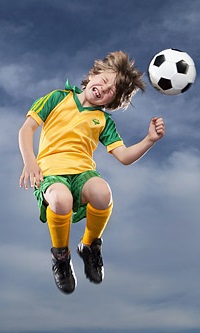Studies needed for concussed kids
 Experts say urgent research is needed on the long-term effects of concussion in young people.
Experts say urgent research is needed on the long-term effects of concussion in young people.
According to The Murdoch Childrens Research Institute, about 33 million young people suffer a concussion each year globally.
However, only one in 10 go to hospital to receive treatment, despite growing evidence on the lasting effects of concussion.
“We know that children take longer to recover from concussion compared to adults,” said Michael Takagi, a neuropsychologist with the Murdoch institute.
“Adults on average will recover in two weeks. The majority of children will recover in a four-week period [but] a significant minority will continue to have symptoms beyond the four-week time frame.”
Dr Takagi is a member of the team behind new international guidelines to tackle the problem of sports-related concussion (SRC) in children, which have been published in the British Journal of Sports Medicine:
- Children and adolescents are expected to take up to four weeks to recover following SRC
- The widespread routine use of baseline computerised neuropsychological testing is not recommended in children and adolescents
- Children only require a brief period of rest followed by gradual symptom-limited physical and mentally stimulating activities
- All schools be encouraged to have a concussion policy and should offer appropriate support to students recovering from SRC
- Children and adolescents should not return to sport until they have successfully returned to school, however early introduction of symptom-limited physical activity is appropriate
“This review documents the best available evidence for the management of SRC in children and adolescents,” said lead author, Gavin Davis.
“[But] the lack of studies that are specific to children, especially younger children, need to be addressed as a priority.”
Dr Takagi agreed more research is needed.
“Despite the fact that in the media and in the general public this is very much on people's minds, we do not know that much about concussion, particularly concussion in children,” he said.
“[If a] child has had a brain injury, a mild brain injury but it is still a brain injury … they do need some time to get back to normal.
“Sometimes it can be quite obvious, so for example, a child would be knocked unconscious … or dizzy and falling down or vomiting.
“But other times it can be relatively subtle, so for example, it could be a headache, fatigue, irritability. So some behaviour changes — especially in young children — sensitivity to noise and light.
“If a child is ever suspected of having a concussion … remove them from that activity, have a look at them, see how they're feeling and if they are experiencing any of these symptoms take them to medical attention right away — that could be going a GP or taking them to the emergency department.”








 Print
Print